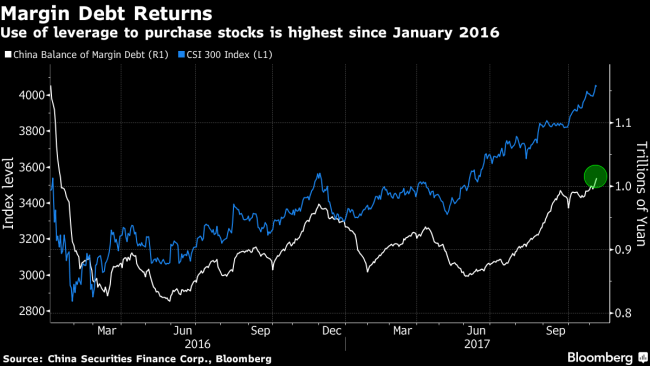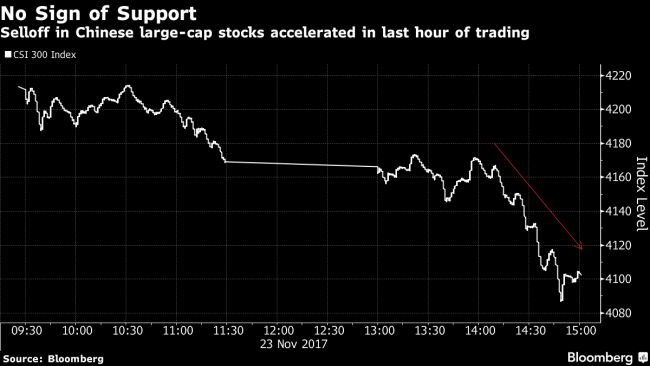(Bloomberg) -- What happened to the Beijing put?
That’s what investors in China are asking themselves after a gauge of large-cap shares plunged 3 percent on Thursday, rattling a market that’s grown accustomed to state support when losses get extreme. While there were signs over the past week that the government was looking to cool gains in high-flying shares like Kweichow Moutai Co. -- along with concerns over rising corporate bond yields -- the severity of Thursday’s slump caught some traders off guard.
The biggest surprise was that losses accelerated into the close. The nation’s CSI 300 Index sank 52 points in the final 45 minutes of trading, the steepest afternoon decline since the depths of China’s stock market crash in January 2016. Such late-day selloffs have been rare this year, with the index rising an average 2.9 points, according to data compiled by Bloomberg.
While it’s unclear why state funds allowed shares to tumble this time, analysts said the episode may help wring some of the complacency out of China’s stocks. Before Thursday’s slump, the CSI 300 had climbed 28 percent this year to the highest level since July 2015. Margin debt, while still well below its bubble peak in 2015, has increased for six straight months.
"Some investors might have been just taking profit in the morning, and that turned into a selling stampede in the afternoon," said Wang Chen, Shanghai-based partner with XuFunds Investment Management Co. "Investments in blue chips were overcrowded, and a lot of them were bought with margin financing."
Hong Kong
The selloff, which triggered a 1 percent slump in Hang Seng, was also a reminder to international investors that turbulence in mainland Chinese markets can spread, at least to Hong Kong; European equities appeared unaffected Thursday. The Hang Seng plunged more than 30 percent after China’s stock bubble burst two years ago.
Futures trading Friday morning suggested that some of the slide could be recouped. Contracts on the FTSE China A50 Index rose 0.3 percent as of 6:30 Hong Kong time. Hang Seng Index futures added 0.2 percent, with contracts on the Hang Seng China Enterprises index climbing 0.3 percent.
For Sun Jianbo, president of China Vision Capital Management Co. in Beijing, valuations among large-cap shares are too expensive for state-backed funds to intervene.
The CSI 300 traded at its highest level relative to the broader Shanghai Composite Index in at least 12 years at the start of this week as investors flocked to large caps such as Moutai and Ping An Insurance (Group) Co.
"There’s no need to prop up the market yet," Sun said. "A lot of big caps are still expensive and it would do more harm than good to state-backed funds if they buy now."
The divergence between large-cap shares and the rest of the market may be one reason why the government took aim at Moutai. Before Xinhua warned last week that gains in the liquor maker were excessive, the stock had more than doubled this year.
Read more: China Targeting its Hottest Stock Helped Trigger a Wider Selloff
Given that much of the gains in Chinese shares this year can be explained by improving earnings prospects, it’s likely that government’s bigger target is leverage, according to Ken Peng, an investment strategist at Citi Private Bank in Hong Kong.
Outstanding margin debt on local bourses climbed above 1 trillion yuan ($152 billion) for the first time in almost two years this month, posing a risk to market stability. Curbing leverage in the financial system is one of the government’s biggest economic policy priorities this year.
Rising margin debt “got regulators a bit nervous,” Peng said. "Earnings are legitimately growing at the fastest pace since the global financial crisis. It’s a proper earnings boom, you don’t want to ruin that with margin debt.”
(Adds futures trading on Friday in second paragraph after ‘Hong Kong’ subheadline.)

